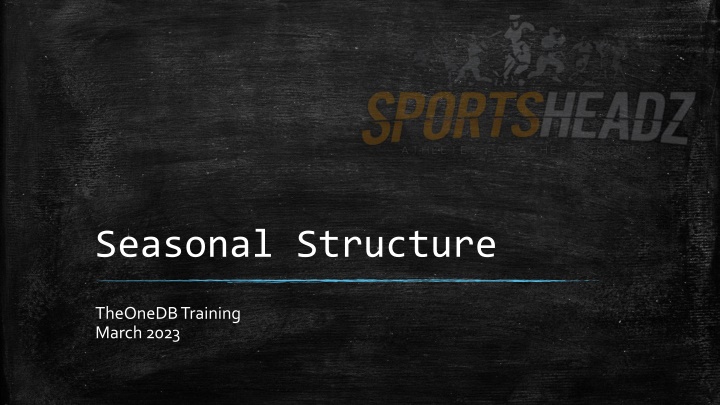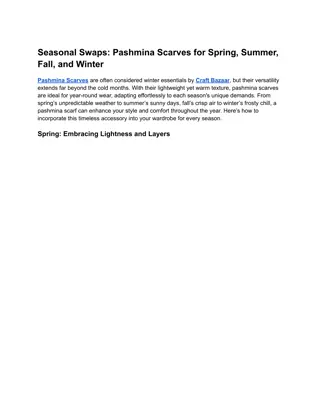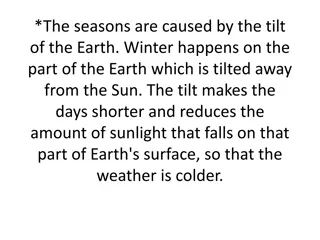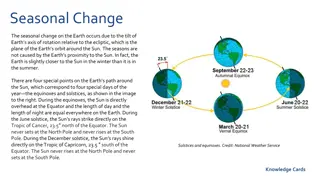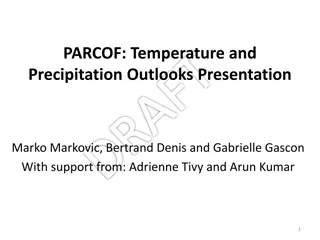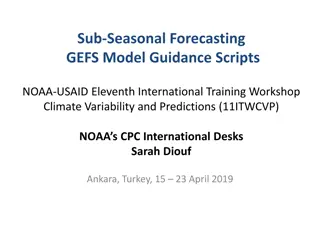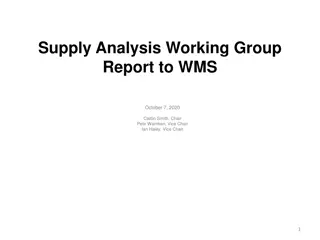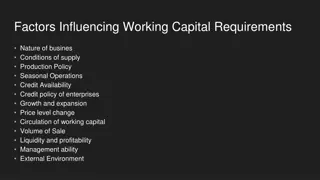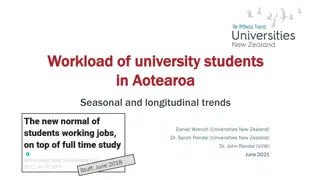TheOneDB Training March 2023: Seasonal Structure Guidelines
Training guidelines for Sportsheadz Staff to manage data in TheOneDB for seasonal structures, including pre-requisites, setting up seasons, associations, and venues. Ensure league existence, manage rosters, and assign locations for games efficiently.
Download Presentation

Please find below an Image/Link to download the presentation.
The content on the website is provided AS IS for your information and personal use only. It may not be sold, licensed, or shared on other websites without obtaining consent from the author.If you encounter any issues during the download, it is possible that the publisher has removed the file from their server.
You are allowed to download the files provided on this website for personal or commercial use, subject to the condition that they are used lawfully. All files are the property of their respective owners.
The content on the website is provided AS IS for your information and personal use only. It may not be sold, licensed, or shared on other websites without obtaining consent from the author.
E N D
Presentation Transcript
Seasonal Structure TheOneDB Training March 2023
Pre-Requisites Sportsheadz Staff will manage the following data to ensure it isn t duplicated Your Leaguewill need to exist and belong to both a sport and a governing body within TheOneDB and will need at least one User. You ll be able to add which Associations have teams in your league, however, missing associations will need to be added to the master list. You ll be able to add which Venues are used for games in your league, however, missing venues will need to be added to the master list. Contact your Sportsheadz rep to request for an association or venue to get added to the system.
Step 1: Seasons A Season is the lifetime of the rosters of teams in your league (almost always correlates to a single year). Example: Teams have tryouts / evaluations and form a roster Teams play exhibition games, then regular season games, then post-season towards a potential championship Teams maybe also enter tournaments at some point All of the above would be within a single Season Go to: League -> Seasons Required: Start Date, End Date, Season Name Note: the Season Name should almost always just be the 4-digit year(s) when games are played within that season. So 2023 for summer sports, and 2023-2024 for winter sports. If there are prior seasons in TheOneDB already, you can optionally copy all the structure from a previous season as a starting point for this new season.
Step 2: Associations An Associationis a collection of one or more Teams, often recognized / licensed by a governing body. Sportsheadz Staff maintain a master list of associations that exist within TheOneDB. Leagues can add / remove associations that belong to their league at any time, but associations who have Teams in the current season should belong to the league while that season is happening. Associations who are linked (using a Sportsheadz website) are indicated with a green chain ( ) icon and may have additional functionality available. Go to: League -> Associations The associations available to be added are assigned to the same sport and governing body as the league.
Step 3: Venues A Venueis the location a game will be played, and in some cases is a collection of venues in the same location. Venues are sport-specific and the master list of venues is managed by Sportsheadz Staff to ensure accuracy and non-duplication. While technically an optional step, any venue authorized for use by the league for any Association and any Team can be added to the list of league venues to enable the assignment of venues to Associations (which is a required, separate, process) later. Sportsheadz Staff may also assist in the assignment of Venues to the Associations who use them. Go to: League -> Venues
Step 4: Groups A Group is a collection of Teams who predominantlyplay against each other during the Season. Most commonly, Groups represent ages ex. Under 13 , Under 15 , etc. In larger leagues, groups may also represent levels of play ex. Under 13 AAA , Under 13 AA , etc. If your League / Season only has one set of teams, a group is not required. It is an option for Teams in different Groups to play in the same schedule for portions of the Season, so Groups should be setup based on what happens the majority of the time. Go to: Season -> Manage Groups Required: Sort Order, Name, and ShortName We recommend leaving gaps in the Sort Orders of your groups to make re-arranging them easier. Ex. Sort Order: 10, Name: Under 13, Short Name: U13; Sort Order 20, Name: Under 15, Short Name: U15 Groups can be created in bulk by using the Bulk Group Management option and creating scripts.
Step 5: Teams A Teamis a collection of players who commonly play against other Teams usually correlating to an official roster issued by a governing body. Teams belong to an Association and are setup as part of a single Season and usually a single Group. To add a Team to a Season / Group, the Association must be a assigned to the League at the time of creation. Teams who belong to an Association who is using a Sportsheadz website should be linked to unlock additional functionality. Go To: Season -> Manage Teams Required: Association, Team Name The Team Name should be pre-filled with the default team name for the Association but it can be changed if needed. If the same Association has multiple Teams in the same group, add labels into the Team Name to help indicate which team is which ex Rangers Blue , Rangers Red When creating Teams it s possible to create for multiple Groups at once if the same Association has a Team entry in more than one Group. Teams can be created in bulk by using the Bulk Team Management option and creating scripts.
Step 6: Rounds A Round is a portion of a season which defines a collection of games which typically generate standings and/or produce a champion. In a typical Season there is a regular season Round followed by a playoffs Round. There can be multiple exhibition, regular season, and/or post-season Rounds if needed. Rounds can be used to create separate standings for sub-sets of Teams within the same Group with the assumption that Teams within a Round do NOT play games against Teams in a separate Round which would impact their own standings. Note: Divisions (discussed later) can be used to create separate standings for teams within the same Round when it s possible or likely those Teams will play against each other. Go To: Season -> Manage Rounds Required: Type of Round, Round Name, Sort Order, Start Date, End Date Other settings may also available, and may change based on sport When creating Rounds it s possible to create for multiple Groups at once Rounds can be created in bulk by using the Bulk Round Management option and creating scripts.
Step 7: Divisions A Division is a sub-set of Teams and games within a Round that produces it s own set of standings. Divisions are optional for regular season Rounds (and should not be used if there s only going to be one division). The most common scenario for a regular season Round is that it does NOT have any divisions created. In this case, TheOneDB will automatically create a Default Division on certain pages. Divisions are required for post-season Rounds, even if there s only going to be one division. Go To: Season -> Divisions Required: Type of Division, Division Name Optional: Sort Order, Description, Start Date, End Date The Start Date and End Date only need to be set if they are different than that of the Round Divisions for post-season rounds only can be created in bulk for each round by using the Bulk Division Management option and creating scripts.
Step 8: Place Teams (Init) Since each Round may, or may not, have Divisions created, the Place Teams (Init) page provides the confirmation of which teams are in which Division, or when there are no Divisions, which teams are participating in the Round. The inclusion of a Team in a Round / Division also provides settings for specifying a Seed and a Rank for each team (among other settings). The most common scenario is to add Teams from the same Group as the Round into each Division or the default division so those teams are listed, however, it is possible to add *any* Team from *any* Group in *any* Season in *any* League. Go To: Season -> Place Teams (Init), and choose the Round
